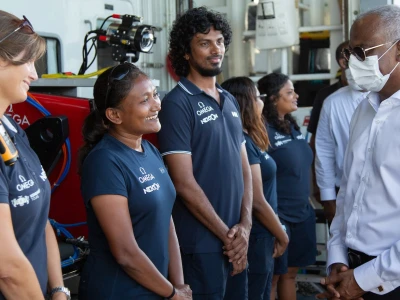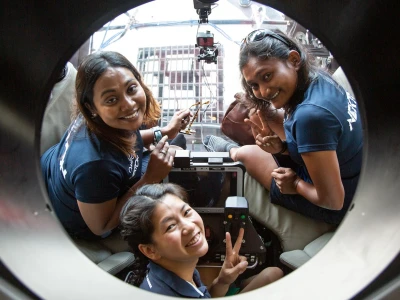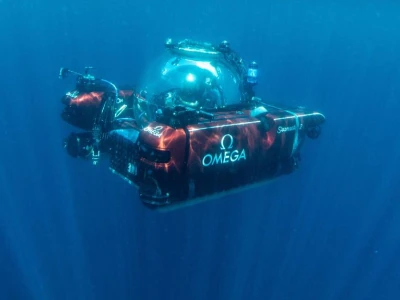
Scientists discover 500-metre-deep oasis of marine life in Maldives
Analysis of the video and biological data is ongoing in the Maldives, Nekton’s UK headquarters in Oxford and at partner laboratories.
Scientists on the Nekton Maldives Mission have found evidence of The Trapping Zone, a 500-metre-deep oasis of marine life that is probably an as-yet-unidentified ecosystem.
Maldivian president Ibrahim Mohamed Solih said the discovery of ‘The Trapping Zone’ and the oasis of life in the depths surrounding the Maldives provides the government with critical new knowledge that further supports its conservation commitments and sustainable ocean management, and almost certainly support fisheries and tourism.
Professor Lucy Woodall, the principal scientist for Nekton, explained that image data, along with biological samples from our submersibles and extensive sonar mapping, all point to megafauna predators like sharks and other large fish feeding on swarms of micro-nekton, small swimming creatures that are trapped against the subaerial landscape at that depth.
The Maldivian atolls’ volcanic subsea layers and fossilized carbonate reefs combine to generate sheer vertical cliffs and shelving terraces that seem to prohibit these animals from diving deeper when the sun rises. The Vertical Migration, the largest nightly migration, occurs when these species normally move from the deep water to the surface at night and return to the deep before dawn.
Large pelagic predators, such as schools of tuna and sharks, as well as well-known, large deep-water fish like the spiky oreo (called after the biscuit) and alfonsino, prey on the trapped animals.
"We’ve observed sharks in shallower waters quite extensively in the Maldives before, but for the first time we’ve been able to document an immense diversity of sharks in the deep sea. Moreover, tigers, six-gill sharks, sand tigers, dogfish, gulper sharks, scalloped hammerhead sharks, silky sharks, and the extremely rare bramble shark have been documented," Shafiya Naeem, Director General of the Maldives Marine Research Institute which has collaborated with Nekton on the expedition, said.
Both the topography and the marine organisms in the ocean define marine ecosystems. Professor Alex Rogers, who spent more than 30 hours underwater in the mission’s submersibles monitoring The Trapping Zone during the expedition said that this has all the hallmarks of a separate new ecosystem.
"The Trapping Zone is producing an oasis of life in the Maldives and it is highly likely to exist in other maritime islands as well as on the slopes of continents," Professor Rogers continued.
The biodiversity hotspots on subsea mountains or seamounts have been related to a trapping effect, but the Maldives and other oceanic islands’ unique geomorphology and biological characteristics have not.
According to Maldivian fisheries minister Dr Hussain Rasheed Hassan, human influences and climate change pose an existential threat to the coral atoll nation of the Maldives.
"We ought to look for science-based solutions that allow us to reduce and adapt to the catastrophic effects of climate change for our very survival as a nation. The bedrock, sediments, and deep-water fauna serve as a record of the evolutionary history of this magnificent nation of coral atolls. This Mission is illuminating how we may apply science to maintain our national existence," he said.
Analysis of the video and biological data is ongoing in the Maldives, Nekton’s UK headquarters in Oxford and at partner laboratories. The discovery may have significant ramifications for managing sustainable fisheries, burying and storing carbon, managing slopes of continents, other oceanic islands, and ultimately mitigating climate change.
Major scientific discoveries have resulted from previous Nekton expeditions. The Rariphotic Zone, or rare light zone, a new ecosystem discovered at depths between 120 meters and 300 meters, was validated by its mission to Bermuda in 2016.




